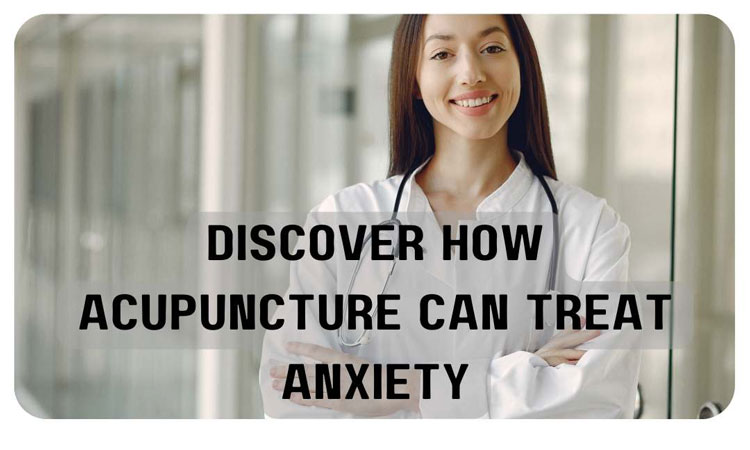Acupuncture may appear to be solely for hipsters who reject Western treatment or your elderly father with persistent back pain, but a growing body of research shows that it can help address an issue that strikes everyone from time to time: anxiety.
According to the Anxiety and Depression Association of America, dealing with extreme anxiety can be challenging since it generally necessitates therapy, which might take months to yield results. Furthermore, it may need the usage of anti-anxiety medication, which may have serious side effects. When acupuncture therapy for anxiety is successful, symptoms can improve after just a few sessions, and practitioners are satisfied that it tackles the issue at its root.
How Does Acupuncture Help With Anxiety?
According to the University of Chicago Medicine, traditional Chinese medicine describes an energy component known as Qi that supports the overall health of the body. Qi, like blood, travels throughout the body via meridians, which are pathways. According to the University of Miami Health System, health issues occur when factors like injury, stress, poor food, or a change in environment disrupt the flow of Qi. According to the University of Chicago Medicine, acupuncturists restore the balance of Qi and the general health of the body by inserting needles at certain points on the body.
Although some may consider this idea outdated, many practitioners think that Qi is just a metaphor for metabolic activity or the chemical exchanges that occur continually in the body.
Each needle is placed near a specific nerve by acupuncturists. Depending on where the needles are put, acupuncture can stimulate the neurological system to produce painkilling chemicals, kick-start the body's inherent capacity to repair itself or engage the part of the brain that governs emotions, including anxiety. All of these discoveries have the potential to improve people's well-being and treat a variety of diseases.
Acupuncture's Mechanisms for Anxiety Management.
Since the 1970s, acupuncture has gained in popularity simply because it works, and there is now extensive evidence confirming its usefulness for anxiety and other mental diseases.
For example, in a study published online in the Journal of Acupuncture and Meridian Studies in October 2013, students who got a 20-minute acupuncture treatment had less anxiety and enhanced memory immediately after the session than those who did not get acupuncture.
What makes acupuncture so effective?
External things outside your control, according to traditional Chinese medicine practitioners, may trigger your anxiety, and acupuncture helps your body to retake control.
“When we are constantly stressed and pressured to achieve, it can lead to illness and other severe health concerns.” Acupuncture is fantastic for maintenance.” It contributes to the transition of a long life into a life of greater quality.
How does acupuncture function?
According to Georgetown University experts, Acupuncture reduces the body's production of stress hormones. In April 2013, their research was published in the Journal of Endocrinology.
Only a few approaches are guaranteed to work 100% of the time. Acupuncture falls within this category, although it offers benefits that established therapies such as psychotherapy and medication do not. Minor adverse effects, such as bruising and dizziness, are rare. However, many prescription medications can have serious negative effects and lead to addiction.
In contrast to counseling, people who undergo acupuncture often see results after only one session, and the results increase with further treatment. Acupuncture is extremely effective for individuals who want to reduce or stop using drugs, whether prescription or illegal. Acupuncture, because it regulates the body's chemical balance naturally, can even prevent patients from needing medicine.
How to Begin With Acupuncture
You have nothing to lose by trying acupuncture. With a trained acupuncturist, the risks are virtually non-existent and far outweighed by the potential benefits. Most acupuncture patients report that they sleep better and have a greater general sense of well-being after only a few treatments.
If you're currently receiving anxiety treatment, you should think about including acupuncture into your regimen. If you find that it works for you, you may gradually wean yourself off of your anxiety medication with the help of your doctor. To begin, check with the major acupuncture registries, such as The Association of Acupuncture Clinicians, to discover if any acupuncturists are available in your region. Then, speak with a practitioner, ask questions and openly discuss a potential treatment plan.
Anxiety Exercises You Can Do At Home:
Breathe Your Way to a Calmer Mind and Body
Nothing beats the classic throat-clenching and chest-grabbing oxygen deprivation that threatens to make you hyperventilate, pass out, or both if you suffer from anxiety. It is quite tough to get back on track when you suffer from acute anxiety. You might consult your doctor for medication, but you can also attempt some simple breathing techniques to help you deal with your worry.
* Recognize What Anxiety Isn't
Everyone is born with a fight or flight reaction, and acute anxiety is just that normal response gone wrong. It is natural to feel worried in most situations when you are likely to feel uneasy. Even if your heart is racing, you are unlikely to die due to anxiety.
* Stop and Stay.
Stop and remain instead of letting the panic reaction take control when you are suffering acute anxiety. Allowing oneself to flee only trains your body to sustain an exaggerated sensitivity to routine stimuli. Instead, take a moment to halt and focus on anything that is likely to be present in any room, such as a light fixture or a clock.
* Take a deep, slow breath in.
When your heart rate increases and your breathing becomes more rapid, you take in too much oxygen. Excess oxygen produces a quick pulse, exhilaration, and maybe tingling in the hands and feet. Take a slow, deep breath in via your nose, filling your chest with air, then gently expel the air through your mouth while keeping your mouth closed.
* Attempt Holding Your Breath.
If slow breathing isn't working, try holding your breath first to help stop the panic almost instantaneously. By avoiding too much oxygen from reaching your brain, you may enable your body to catch up and practice the deep breathing approach indicated above.
* Practice makes perfect.
Most things in life are not easy, and breathing in this way is no exception. Try deep breathing for 10 minutes every day when not in a stressful situation. Allow plenty of space for your lungs by sitting or standing comfortably with your upper body upright. Deeply and slowly inhale, pulling air to the bottom of your lungs, then softly exhale.
* Practice Monitored Breathing
Perform the above exercises alternately with regular breathing. Many of us have established the practice of breathing very shallowly, which deprives us of oxygen until we experience a panic episode, at which point we overdose. So, when you're doing your normal breathing, think about it carefully. Make sure you're breathing into your diaphragm. Consider how a newborn seems when he or she is breathing. That is the correct technique.
Breathing properly under stressful situations may help you lower your anxiety levels many times over, but you must practice it when you are not worried to guarantee that you can take command of the situation. If you have a friend, ask him or her to assist you in breathing by urging you to halt, remain, and breathe.
This article is brought to you by Frome Acupuncture Practice
The post Release Yourself From The Torture of Anxiety With Acupuncture appeared first on https://buydroppeddomains.com
The post Release Yourself From The Torture of Anxiety With Acupuncture appeared first on https://gqcentral.co.uk




